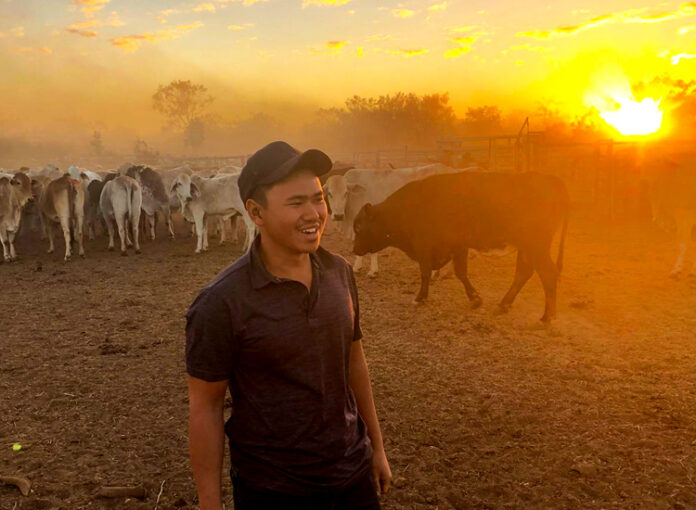Membaca referensi dokter muda ini kesan dokter berbaju putih, klimis, dan wangi langsung menguap. Ya, dokter yang satu ini memiliki karier dan hidup di outback Australia yang jauh dari mana-mana. Mari kita tanya-tanya soal kehidupan pribadi, profesional, dan, tentu saja, yang disukainya.
1. What’s your full name?
My full name is Peter Putra Nugroho
2. Have a nick-name?
People in the Northern Territory know me as Pet Nug, Nuggy, or Just Little Pete.
3. Where do you live? And are you married with children?
I currently live in the Northern Territory mostly based in a small rural town called Katherine, 300km south of Darwin.
I am not married and still single at the moment with no children. Most of my close relatives are back in Indonesia.
4. You are born and bred in Jakarta, mind to tell us your upbringing?
I was born in South Jakarta, Indonesia in 1992. I have three older brothers and was raised by humble, loving, and hard working parents.
My family and I moved to Sydney, Australia, when I was 6 years old and resided in Sydney until I was 11 Years old. We moved back to Jakarta in 2003 and completed SMP and SMA in Lippo Karawaci, Tangerang. After high school, I applied to every veterinary school in Australia, hoping to fulfill my long life dream in working with animals as a vocation.
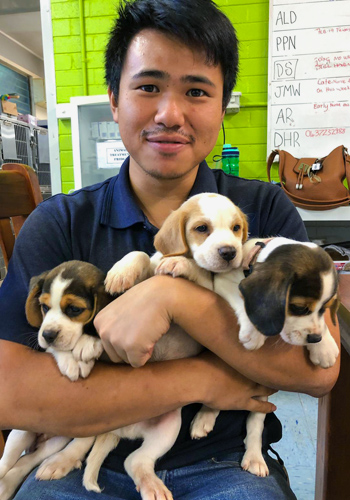 5. Tell us the story of your first pet.
5. Tell us the story of your first pet.
I have always grown up with household pets. I had an army of chickens, birds, fish, dogs, cats, rabbits, turtles, and lizards during my time in Indonesia and Australia. My mother has always been an animal lover and dad always supported us in having our own ‘zoo’ at home.
My real first pet (or pets I should say) that I really got attached too emotionally would be my dogs, Jay & Kelly. We got them together in about the same time when I moved back to Jakarta from Sydney. Jay was a beautiful natured Golden Retriever that would just follow you around wherever you go and Kelly was an independent intelligent Beagle that only wanted cuddles when you’ve had a bad day.
Moving back and forth from Jakarta and Sydney gave me a cultural shock at times. The transition and adaptation into living back in Jakarta after spending the whole primary school years in Sydney was quite emotional during my pubertal teenager years. Jay’ and Kelly helped me through these years and that is why they became such an attachment. I remembered a time when I went through a difficult time making friends simply due to cultural and interest differences. I would go home and isolate myself, however Jay and Kelly would always come over, wag their tails, and simply wanted pats and cuddles.
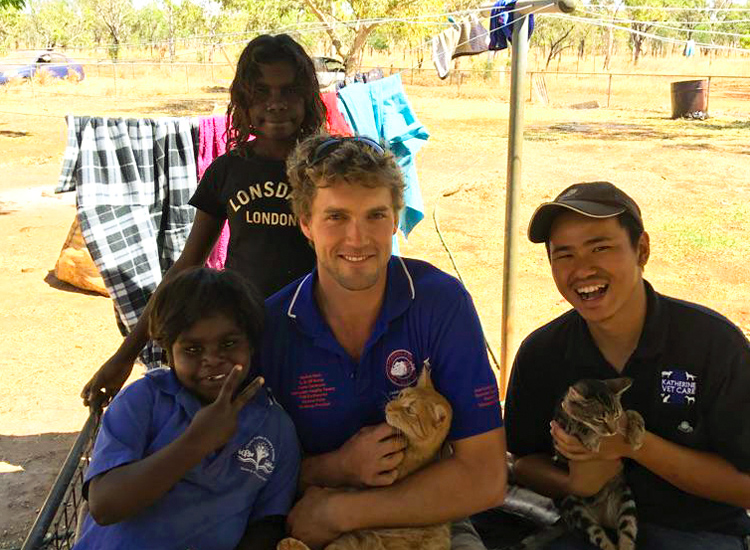 6. What makes you so into animals? Any compelling stories behind that?
6. What makes you so into animals? Any compelling stories behind that?
I can talk for a long time in regards to this question. To make it concise I’ll break it down into 2 main categories of why I love being with and working with animals.
A. Physical traits
I remember when I was about 8 years old, my parents got me an encyclopedia of animals A-Z, and straight away I wanted to be a zoologist. I was at awe of how everything about nature is perfectly ordered. Reading about how every type of animal is designed according to their surroundings and purpose. I remember reading about a bird called the Homing Pigeon. From birth these pigeons already know where to migrate, traveling up to 2,000km even if they have never traveled there before.
During my vet school years, I remembered studying all the anatomy of different animals including humans. I am still amazed at how our organs down to the cellular level work together and complement each other in an orderly fashion to sustain life.
B. Mental traits
Secondly, there is a lot we humans can learn from animals. One of them is their will to survive in the midst of adversity without complaining. Before Jay and Kelly passed away due to a deadly infectious disease, they still wagged their tails and we literally didn’t know that their organs were failing until the last 20%. Despite their discomfort and pain they still wanted to follow us around the house. I think we humans can give up or complain too easily at times.
Although Jay and Kelly passed away from the same cause, they passed 4 years apart from each other. When Jay went away first that was when I got serious in becoming a vet.
7. Tell us your formative years as a vet.
I received my veterinary degree from James Cook University in Townsville, Queensland. The training took me 5 years to complete and during our semester breaks, we were obliged to do internships/placements in various farms and veterinary clinics. This gave me the opportunity to see rural Australia and its beautiful people and culture. I got to travel to rural NSW such as Mittagong, rural Queensland such as Mt. Isa, Moranbah, and Longreach, and the Northern Territory such as Katherine.
When I graduated, I spent my first year as a vet in tropical Cairns, QLD, and finally made the move to Katherine, Northern Territory early 2017.
8. And what’s the story of taking the education here in Australia?
After graduating from High School in Indonesia, I applied to every Vet school in Australia but was only accepted a direct entry by JCU. I was hesitant at first because I did not know a lot about Townsville and I’ve also never lived in a place with a population under 5 million people. In addition, the vet course had a strong emphasis on producing rural veterinarians. Lo & behold it was like a paved pathway for the start of my vocation. Not only did I meet the most beautiful people, the course introduced me to a new passion for cattle production and veterinary public health.
9. How long have you been in Australia?
And how do you grow interested to have “a vet career” here?
I have been in Australia on and off as mentioned earlier. I was born in Jakarta and lived there for 6 years before moving to Sydney. When I was 11 I moved back to Jakarta until I was 18. And I have been to Australia again since I was 18. So that equates to 15 years in Australia now.
When I applied for vet school initially I wanted to become a Small Animal Medicine Specialist. In Indonesia this is equivalent to an “internis” but for small animals such as dogs and cats. But during my study, my view of veterinary medicine got wider.
I learned that being a vet is not just about dogs and cats.
I currently work as a mixed animal veterinarian in a small town called Katherine. This means I deal with a range of patients from dogs, cats, horses, cattle, sheep, goats, rabbits, and wildlife including crocodiles (which we have a lot here in the Northern Territory). In addition, being a vet is not limited to just the individual animal, however, we play a role in the various interactions between animals-humans and animals-environment. Hence, my vet career has allowed me to grow in other areas such as biosecurity, food security for the human population, managing zoonotic diseases, improving animal welfare, livestock production, and environmental sustainability-related to animal production.
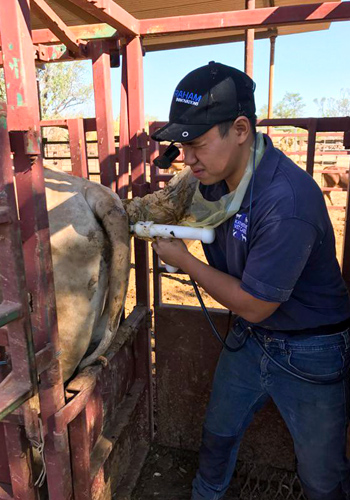 10. I’m always fascinated by cow birthing. Do you have a story about that one?
10. I’m always fascinated by cow birthing. Do you have a story about that one?
One of the main jobs we do here is to help farmers (our clients) to manage their herd of cattle in respect to health and reproduction.
A large part of the management is called “Pregnancy Diagnosis? or in Bahasa Indonesia ‘Pemeriksaan Kebuntingan (PKB)’. It is a process where we check cows for their pregnancy status and depending on the stage of pregnancy the farmer can make decisions on how we can ensure that the individual cow’s welfare can be improved throughout the year. Fortunately, for me, one of the ways in doing this with the least stress for the animal is via per-rectal. This means my daily job can be a bit dirty especially if you have to do 500-1000 cows a day.
However, I have assisted a few times in cows giving birth before both in Indonesia and the Northern Territory. It still amazes me how a pregnancy starts off with a microscopic cell and with perfect order they turn into a 35-40kg calf in 9 months’ time.
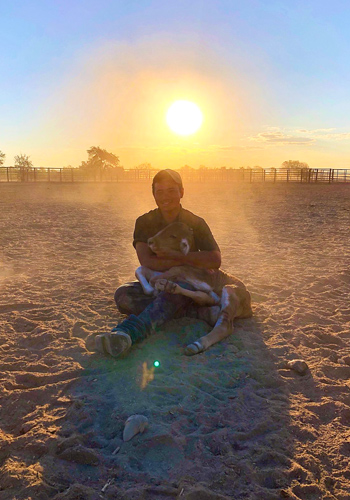 11. In your perspective and experience, what are the downsides and upsides of this profession?
11. In your perspective and experience, what are the downsides and upsides of this profession?
Being a veterinarian definitely has its ups and downs, but mostly ups! Being a vet is certainly a satisfying vocation. Helping an animal heal using knowledge and science is an amazing blessing. And the feeling you get from just treating one animal and the smile and gratitude from the clients (loved owners) beat all failures. The work-family and the different people you meet whether in consults, farms, and colleagues is also an upside. In addition, being a mixed animal veterinarian in Katherine, we cover a lot of distances to go to our clients and see the patients. This gives me an opportunity to see spectacular views and sunsets around Australia.
However, there are times where it can be tiring physically, mentally, and emotionally. Physically, being a vet at most times does not involve a certain schedule of working hours. When a dog or a horse comes in for an emergency at 6 PM or 12 AM, we don’t have the option to say no. There are definitely times where we have to sacrifice our planned schedules or commitments and precious sleeping time in order to treat these emergencies. However, as I mentioned earlier saving one animal whether in working or after hours overwhelms all the failures and hardships.
Mentally and emotionally, the veterinary career is known to have one of the highest suicidal rates in Australia. This comes from being physically drained due to the constant influx of sick animals, also the emotional factor transferred from upset clients (owners) and at times, simply the constant exposure to death can be overwhelming.
Fortunately, the industry is well equipped and working hard in giving support through the Australian Veterinary Association to all vets. More importantly, having a supportive and optimistic work family is vital. Having a hopeful belief and faith also helps me to look at it from a positive perspective.
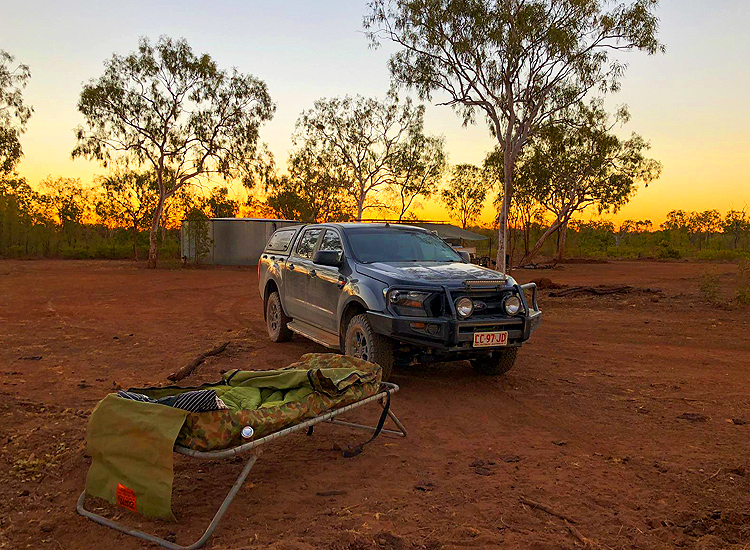 12. You said “when you do your job in the bush” what does it that mean?
12. You said “when you do your job in the bush” what does it that mean?
Yes, when I say my job involves me driving to the bush this means that although our clinic is based in the small town of Katherine, we also drive to cattle farms outside Katherine where there is no phone signal, sealed roads, and any form of buildings for hundreds of kilometres. Sometimes we have to camp in the ‘bush’ with just a sleeping bag (or we call it a swag). For example, a cattle farm can be located 500km away from Katherine and because I may have to check more than 1000 cows for a single job, we have to camp out for a few days until finished.
In addition, the clinic also has 3 airplanes! This is because we cover a lot of distances in a limited amount of traveling time. For example, we regularly go to Torres Strait, which is close to Papua New Guinea and just North of Weipa, QLD. Some cattle stations are also simply too far from Katherine, like last year we had to go to different stations between Katherine, NT, and the Pilbara in WA.
13. Any memorable experiences you have in the bush?
I think going out bush is one of my favorite experiences. Sometimes I have to go to stations that are 500,000-1,000,000 acres. The experience of having tea from a billy and cooking food from a campfire still excite me. During the night, sleeping in a swag without electricity or lights you can see all the stars and the moon. You can hear the insects, birds, and wind so clearly and it is definitely a good break from the busyness of the city! No phones disturb you, just nature at its best. More importantly, we get to meet and know the people that you camp with very well.
14. What does your on-duty life look like?
Well, there are definitely different types of days being a mixed practice veterinarian. Sometimes you can start your day early in a cattle farm 400-600km out of Katherine pregnancy testing or you can start your day in the clinic. In the clinic, we usually do surgeries and consultations for dogs, cats, wildlife, and horses if the client can bring them in. And after the clinic closes, depending on the roster, you also have to be ‘on-call’ in case of emergencies that happen during after hours.
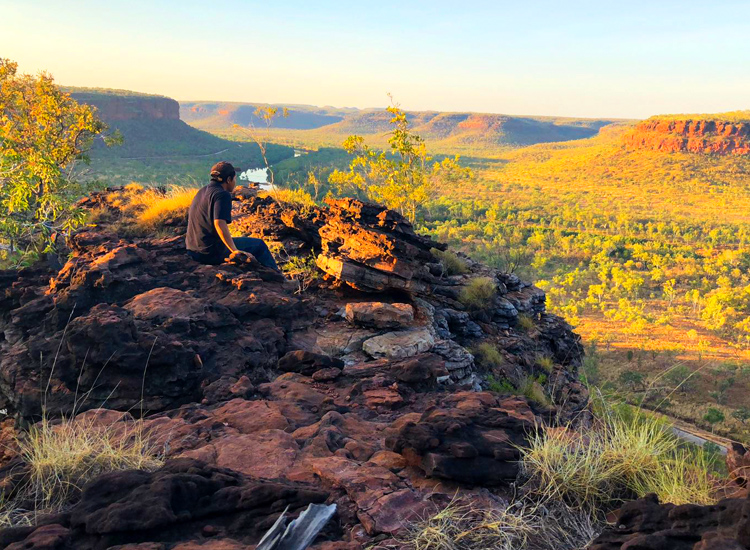 15. And what does your off-duty life look like?
15. And what does your off-duty life look like?
In my days off, I do like going for a hike, a little bit of horse riding in the morning or the afternoon, and definitely a catch-up call with family in Indonesia!
16. I read that dog and cat too can be contracted Covid-19. Can the virus also infect farming animals, like Cow or Sheep? How do you treat/prevent that?
This is a good question and a fitting one, given the situation at the moment. There have been reports from China, Hong Kong, and the U.S, that cats, dogs, lions, and tigers have tested positive for COVID19. Fortunately, there is still no evidence that transmission from animal to human is possible or plays a big role in the spread. Despite the lack of evidence, we do take precautions and this involves good hygiene practice such as washing our hands regularly after contact with any animal and using proper biosecurity equipment such as masks and gloves when required.
17. When you take a leave, what do you do mostly?
I also have another nickname and that is ‘fly-boy’! This is because when I take my leave I always go back to Indonesia to see family. Katherine is quite close to Darwin! It is only 300km away and Darwin to Bali is only 2 hours and a half by plane. So, before COVID-19 happened I would go to Bali for 3-4 days or even go to Jakarta for a week to see my family!
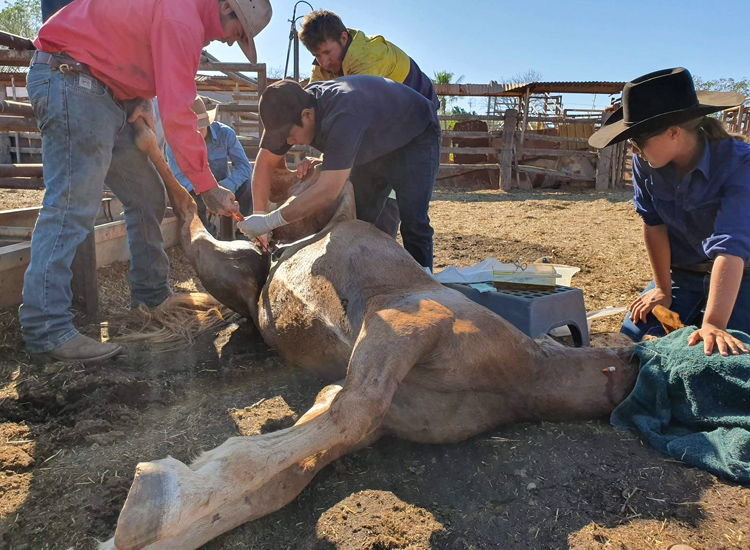 18. You treat sick animals and maintain their health. How do you treat your homesick? And what you usually do when you suffer that?
18. You treat sick animals and maintain their health. How do you treat your homesick? And what you usually do when you suffer that?
This is a very deep question hehe. I am not going to lie, I do get very homesick mainly because most of my family members are in Indonesia and I do not have a lot of relatives living in the Northern Territory. As mentioned earlier, I do go back to Indonesia quite a bit before COVID-19, and that usually fixes my homesickness! The other important remedy is to have a beautiful family in Katherine. I am fortunate enough to have a loving, supportive, and hilarious work family.
19. In reference, you said you will definitely return to Indonesia. What would you do? Any pictures of the future?
I am still not sure if I will definitely return to Indonesia 100%, but I definitely would love to contribute back to the motherland in regards to veterinary-related matters! I have a strong belief in the comparative advantage both Australia and Indonesia can provide for each other in relation to sustainable and efficient livestock production, food security, regional biosecurity, and animal welfare standards! I believe there are collaborations that each neighbour can contribute equally to ensure that we protect each other from emerging diseases that may harm both the economy and public health systems.
I am currently interested in researching ways we can help farmers in Indonesia to be more efficient and sustainable by improving overall animal welfare and environmental factors. Specifically, finding ways to detect harmful diseases in livestock earlier. With a proper system, we can help producers prevent losses by being more prepared. Hence, I see my future along these lines!
20. Let’s play favourite.
Animal: Dog
Food: Ketoprak
A place to hangout: Anyplace with good coffee and views!
Work tool: Pregnancy testing gloves
21. Anything you can’t live without? And why is that?
Hmmm… probably nature itself because I wouldn’t have a job.
22. Are you a vegan?
No! I am still an Omnivore. [IM]



